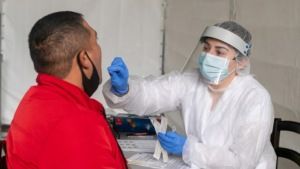News
Don’t randomly buy corona quick-tests, warns study. Some of them are woeful!
This article is more than 3 years old.
Some 18 months of research, involving 65 million kits and numerous samples, concludes that the best choices are Flowflex and Wondfo

PCR tests are still the best choice, but some quick options are almost as accurate (photo: Konstantin Ventslavovich)
A study carried out by Region Midtjylland on behalf of the Styrelsen for Forsyningsikkerhed reveal that some corona quick tests are woeful.
There are 46 different kinds of throat, nose and saliva tests approved for sale in Denmark, and one of them only had an accuracy rate of 2.5 percent at detecting corona.
The best performing test, in contrast, had a 94 percent accuracy rate. Nine of the 46 had an accuracy rate of over 90 percent.
Each test was applied to 700 samples: 500 positive cases and 200 negative cases.
Flowflex is the best choice
Quick tests are still available at centres, although many have closed since the government’s confirmation that they will cease to operate on March 6, but mostly they are used for self-testing at homes, schools and workplaces.
Region Midtjylland has been assessing the tests since the summer of 2020. Overall it has bought 65 million testing sets.
The best performing, with 94 percent, is Flowflex, which is produced by the US manufacturer Acon. A close second with 93 is Wondfo.
“It is surprising that it was a home test where you have to inoculate in the outer part of the nasal cavity, which turned out to be the best,” study leader Dr Uffe Vest Schneider from Hvidovre Hospital told DR.
On a par with the centres
In contrast, the PCR tests have an accuracy rate of 98-99 percent, while the quick test centres operated by CPH Medical, Falck and Carelink had respective success rates of 92, 87 and 84 percent.
Region Midtjylland is happy because it chose Acon, which can be purchased online, to be used at its public institutions.
The study is currently being peer reviewed.
Ignore the instructions!
Sometimes, advises Schneider, it is best to ignore the instructions!
“If you need to take a quick test, take a test from the front of the nasal cavity. Avoid throat tests (except for PCR) and especially saliva tests, which are the worst at finding infection,” he said.
“When you take a test, you don’t necessarily have to follow the instructions. Put the swab straight in, so horizontally, and about three cm. That way a sample is taken from the anterior part of the nasal cavity.”
In other corona news:
– The reproduction rate is now 0.9, thus indicating that the infection numbers are falling by 10 percent across the country. They have certainly fallen in eastern Denmark and the capital, but are rising in western Denmark.
– Some 71 deaths have been recorded over the last two days, which may seem quite high. However, included in the numbers is anyone who has contracted corona over the last month.
– There are only 31 corona patients in intensive care today, of whom 13 are on respirators.






































